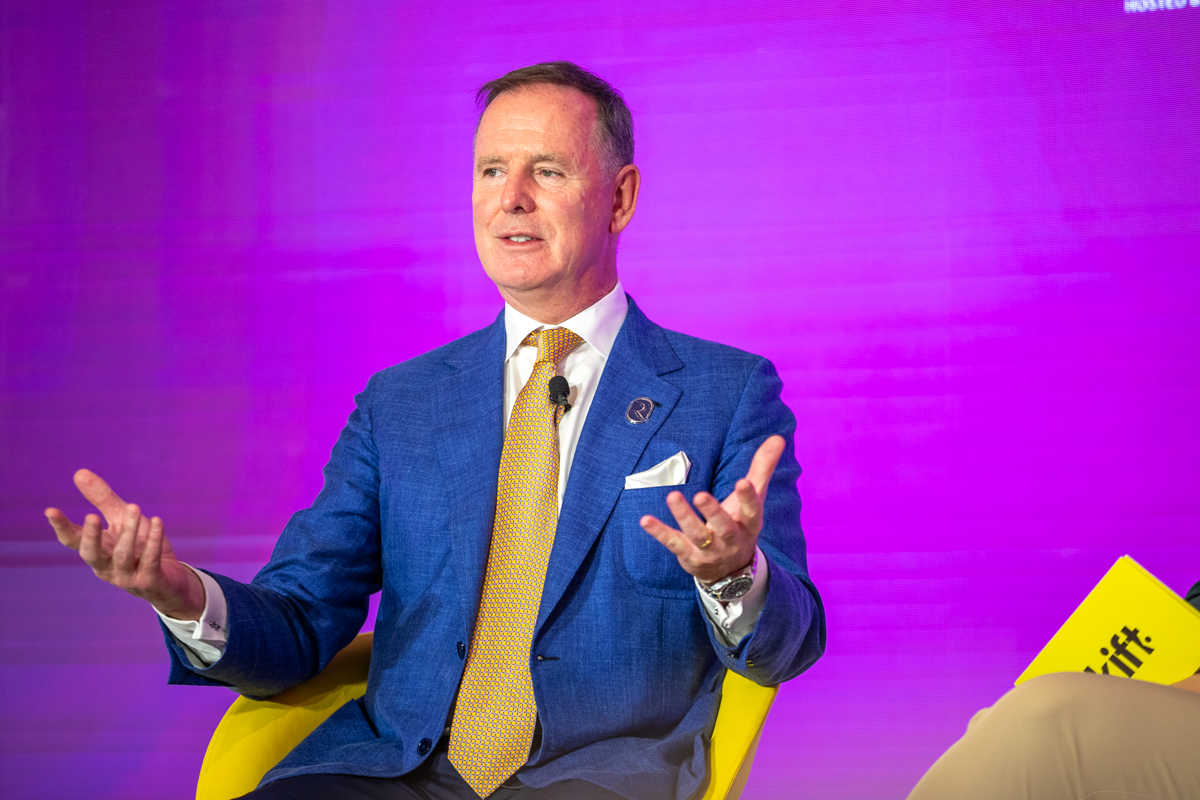Hotel CEOs' Views on Homesharing Evolve Even as Industry Remains Critical

Skift Take
During Marriott's first quarter earnings call earlier this month, Marriott CEO Arne Sorenson suggested that his company would deliver a "better product" for homesharing than its peers, Airbnb included, thanks to Marriott's strong brands, service, and loyalty.
It was a marked contrast from what Sorenson and his fellow hotel CEOs have said previously with regard to homesharing and to Airbnb, and it hinted at a future where it won't be uncommon to have traditional hotel brands advertising their own short-term rentals.
To date, Marriott, Hyatt, and AccorHotels are all active participants in the growing private accommodations market, as are Choice Hotels and Wyndham with their respective vacation rental businesses.
One hotel industry holdout, however, remains.
Hilton CEO Christopher Nassetta, speaking on Hilton's first quarter earnings call in April, said that while Hilton has "spent a huge amount of time over the last few years looking at" the homesharing space, the company has concluded, "We have not decided to do it."
"We believe it's enough of a different business that it is not something that we need to or should focus on, that delivering for our customers the core experience of a very high-quality consistent differentiated product with amenities associated with it and with very high-quality consistent service delivery is what they come to us for," Nassetta said.
Still, Nassetta also added, "That's not to say that we wouldn't consider that [getting into homesharing] in the future at some point."
The homesharing business — including its poster child, Airbnb — has often been a target of the American Hotel & Lodging Association (AHLA), an association that counts Marriott, Hilton, Hyatt, Choice, and Wyndham among its members. It's also an association which has published reports that say that Airbnb and homesharing platforms have contributed to housing shortages in major cities throughout the U.S.
So, what's different about today that makes it easier — and more acceptable — for hotel companies like Marriott to offer homesharing? And what does that mean for the AH&LA and its objectives for regulating short-term rental businesses?
The Evolution of What It Means to Have "a Level Playing Field"
Last June, a number of hotel CEOs told Skift they didn't see Airbnb or other short-term rental platforms as a threat to their business, and that all they hoped for was for a "more level playing field" when it comes to regulations.
It was around that same time last year that Airbnb and the AHLA were engaged in a still-ongoing battle in the press.
Sorenson, when asked by Skift last June what he thought of AHLA's efforts to call for more regulation of short-term rentals, said the "core aim is to achieve a level playing field" in terms of taxes paid, safety, and accessibility.
While speaking to investor analysts on Marriott's most recent earnings call, Sorenson explained why Marriott thought now was the optimal time to test out homesharing because of regulations and laws that would make it legal — at least in certain jurisdictions, such as London, where Marriott's pilot is currently taking place.
"One of the reasons we didn't jump into this quickly is we thought this is a business that is not made for us," Sorenson said, referring to the legality of home rentals. "We have now figured out that we can run this business in a way that does fully comply with law."
In London, where Marriott is conducting its pilot with Hostmaker, the local regulations on homesharing are fairly straightforward, with a 90-day annual cap. Sorenson also noted that in London, Marriott is ensuring it will pay any appropriate taxes to local authorities.
Sorenson also described companies such as Airbnb as operating illegally when they first launched.
"It's one thing for a startup to engage in a business that really does not comply with law, it'd be another thing altogether for a 90-year-old company like Marriott to step into a business, which is fundamentally illegal," he noted.
And in some ways, while Sorenson may be right in that assessment, he's also dismissing the work that companies like Airbnb have done to make it possible for companies like Marriott to enter into the homesharing space today, whether lobbying for tax collection agreements and working with local municipalities to come up with annual caps on homesharing in cities where housing is limited.
In April, AHLA issued a press release calling for more "transparency and oversight in taxing Airbnb." In it, Troy Flanagan, vice president of government affairs and industry relations at AHLA, said, “Airbnb has been making back-room deals and strong-arming state and local jurisdictions into ‘voluntary’ tax deals with no transparency, oversight or auditing capability to ensure the company pays its proper share of taxes.
"It’s like putting an empty jar at the counter of a retail store," he said, "and asking customers to voluntarily pay sales taxes. There’s no accountability.”
If Marriott's homesharing pilot in London proves to be successful, and Marriott decides to bring Tribute Portfolio Homes to the U.S., another bigger question looms: How will opponents of homesharing like the AHLA respond, and how will the hotel industry redefine what it means to have a "level playing field?"
When Skift asked the AHLA for its thoughts on homesharing, the organization gave us the following statement from Flanagan:
“Hotels are in the people business, and committed to meeting the needs of our guests. AHLA has long-held the position that Airbnb needs to do more to rein in commercial operators using its platform to run illegal hotels that skirt local and state laws, tax collections, or safety and security standards."
But what about executives like Marriott's Sorenson who are pushing ahead in homesharing?
"Our understanding is that Marriott has launched a pilot program in one city, to provide a select number of full-unit homes as a complement to their portfolio of hotel accommodations, to meet the needs of a subset of consumers," said Flanagan. "They have partnered with a property management expert to carefully select and screen homes that offer a certain set of guest amenities, provide 24/7 guest support, and ensure compliance with safety and security standards.
"As our members continue the lodging industry’s long-standing tradition of innovation," Flanagan added, "we’re confident they will be more respectful of communities than the platforms that have aided the proliferation of illegal hotels in recent years.”




